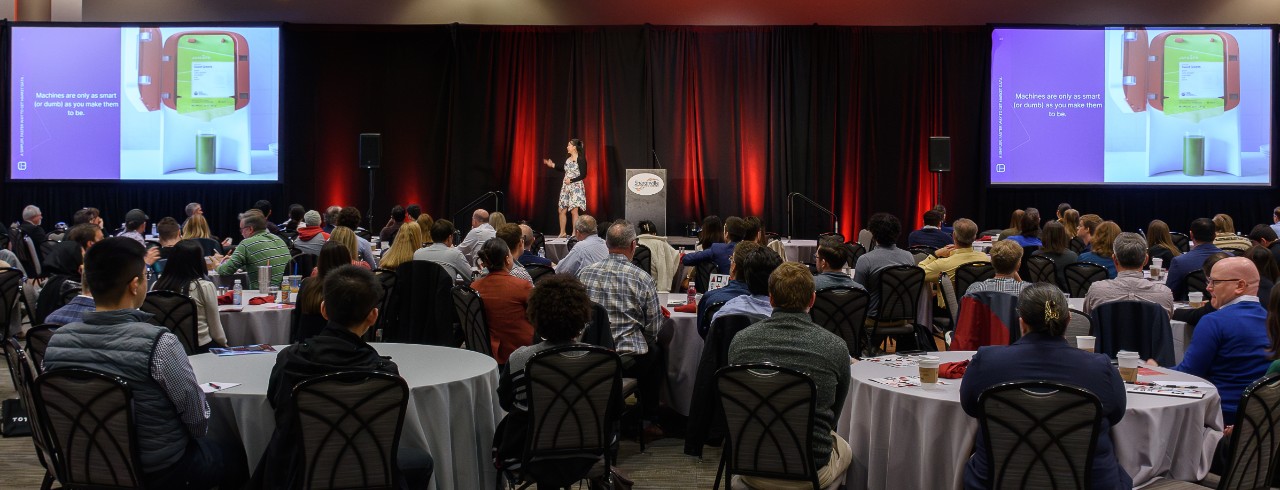
ChatGPT, future of data science spurs conversation at 2023 Analytics Summit
Speakers and attendees reflected on change and the future of industry
The Center for Business Analytics, housed in the Carl H. Lindner College of Business, held its 2023 Analytics Summit on May 2 at the Sharonville Convention Center, welcoming nearly 300 attendees to the all-day conference. The event hosted prominent industry speakers who covered topics from artificial intelligence (AI) and ChatGPT to data analytics for social change.
The center serves the business community through leadership development, analytics training, consulting services, student engagement and public events like the Analytics Summit. The summit’s intention is to highlight analytics and data science content to bolster the growth and development of analytics efforts in business, government and non-profit organizations.
“This year's analytics summit was a great success, bringing practitioners, business leaders and academia together. Exceptional bookend keynotes from Christina Qi and Xiao-Li Meng set the stage for 15 excellent presentations on analytics and data science, including a ChatGPT primer,” said Glenn Wegryn, executive director of the Center for Business Analytics. “Presentations covered important topics in data management and applications in operations, marketing, finance and sales.”

Glenn Wegryn, executive director of the Center for Business Analytics, kicked off the event with his opening remarks.
Wegryn welcomed attendees, acknowledging the many new faces in the crowd. Michael Fry, PhD, the center’s academic director and professor of operations, business analytics, and information systems (OBAIS), then took the stage to celebrate recent achievements for the business analytics’ degree programs, including increased enrollment in undergraduate degree programs and the launch of the online Master of Science in business analytics.
Wegryn returned to the stage to introduce the day’s first keynote speaker, Christina Qi, a Forbes “30 under 30” honoree, member of the MIT Board of Trustees and CEO of Databento, a pay as you go market data vendor. Qi acknowledged the caliber of Lindner’s academic programs and commitment to co-op.
“Talking about the programs that UC has to offer, as well as the co-op program, as an employer, that's music to my ears,” said Qi. “I love it when there are opportunities for students to be able to do more outside of the classroom. I think that's awesome.”

Keynote speaker Christina Qi answered questions from the audience after her presentation.
Qi showcased her expertise on an array of topics, highlighting how ChatGPT and other advancements in generative AI are changing the employment landscape. After her address, Qi didn’t shy away from difficult questions, tackling issues like bias in AI and the impact of recent bank failures on the technology sector, including her own business.
Throughout the day, attendees could choose from sessions that followed one of five tracks: business intelligence, advanced analytics, operations analytics, public analytics and commercial analytics. Speakers brought together demonstrations and detailed case studies to offer attendees tangible examples to apply in their roles outside of the summit.
One of the day’s most highly attended sessions was hosted by Lindner’s Jeffrey Shaffer, assistant professor-educator of OBAIS and Joseph S. Stern Professorship of Practice, and Bill Nicholson, assistant professor-educator of OBAIS. The session covered the technology behind ChatGPT, as well as ChatGPT’s capabilities, applications, limitations and impact on education, data science and more.
“The implications as a teacher, as a professor, are that we can put some questions in ChatGPT and probably get a good enough answer,” cautioned Shaffer, echoing much of the messaging from the opening keynote. “And students are already using this. So, we're going to have to rethink how our job is done.”

Jeffrey Shaffer, assistant professor-educator of OBAIS and Joseph S. Stern Professorship of Practice, gave session attendees a primer on ChatGPT.
Xiao-Li Meng, PhD, Whipple V. N. Jones Professor of Statistics at Harvard University and editor-in-chief of Harvard Data Science Review, delivered the closing keynote, continuing the day’s throughline of evolution as he discussed the changes to the data science field over time.
The event left attendees with plenty to chew on as they confronted the inevitability of change and how to best harness these developments to improve their roles, career prospects and businesses.
“Technology will always be adopted. I realize that it's already been decided for us,” said Qi. “Bot or no bot? I think the answer for me is pretty obvious. Even if we said no, that's like trying to stop a hurricane. It's already coming.”
Featured image at top: Keynote speaker Christina Qi began the event with her presentation "2023: Fantastic Machines and How to Tame Them!" Photos/David Bauer.
About the UC Center for Business Analytics
The Center for Business Analytics unites organizations and a world-class, multidisciplinary group of faculty and students to educate and exchange ideas and best practices on applying analytical methods to enhance business performance. To inquire about membership, sponsorship or speaking opportunities, email UCBusAnalytics@ucmail.uc.edu.
Related Stories
Real estate students, professionals gather for UC/PNC Economic Outlook
February 18, 2026
The 32nd annual UC/PNC Economic Outlook was held on Feb. 13, with more than 350 attendees — including more than 70 real estate students — taking in perspective on local, national and international economic developments at the newly reopened First Financial Center in downtown Cincinnati.
Get ready for your next job with a NEXT Mindset
February 17, 2026
University of Cincinnati students will discover how to prepare themselves for the workplace during the NEXT Mindset Professional Readiness Day on Feb. 24 at the 1819 Innovation Hub.
How sports gambling is changing the game
February 13, 2026
Fantasy sports and the wager on which team will win a game are nothing new. But with sports gambling apps making it practically effortless for people to wager on just about any aspect of a match, gambling’s popularity is changing the game. The Journal-News turned to Mike Fry, professor of operations, business analytics and information systems at the University of Cincinnati’s Lindner College of Business to break down the rise and the risks of sports betting.
